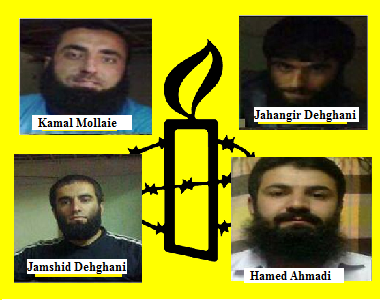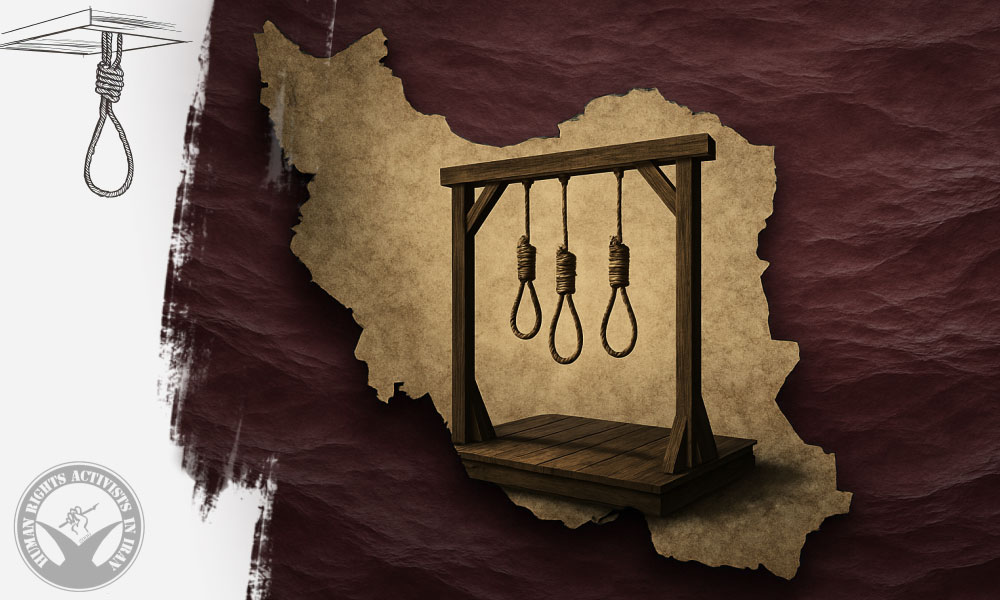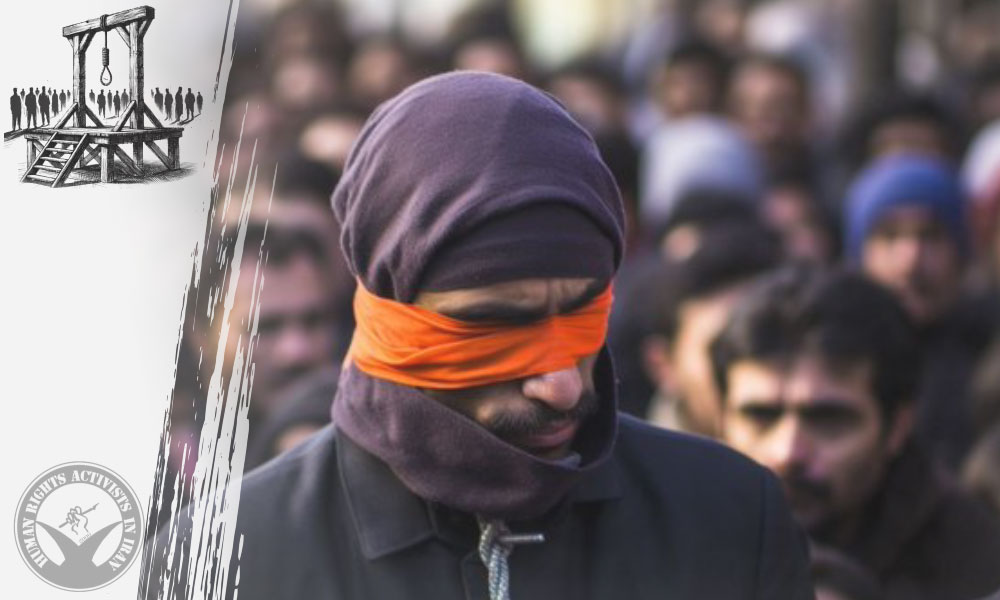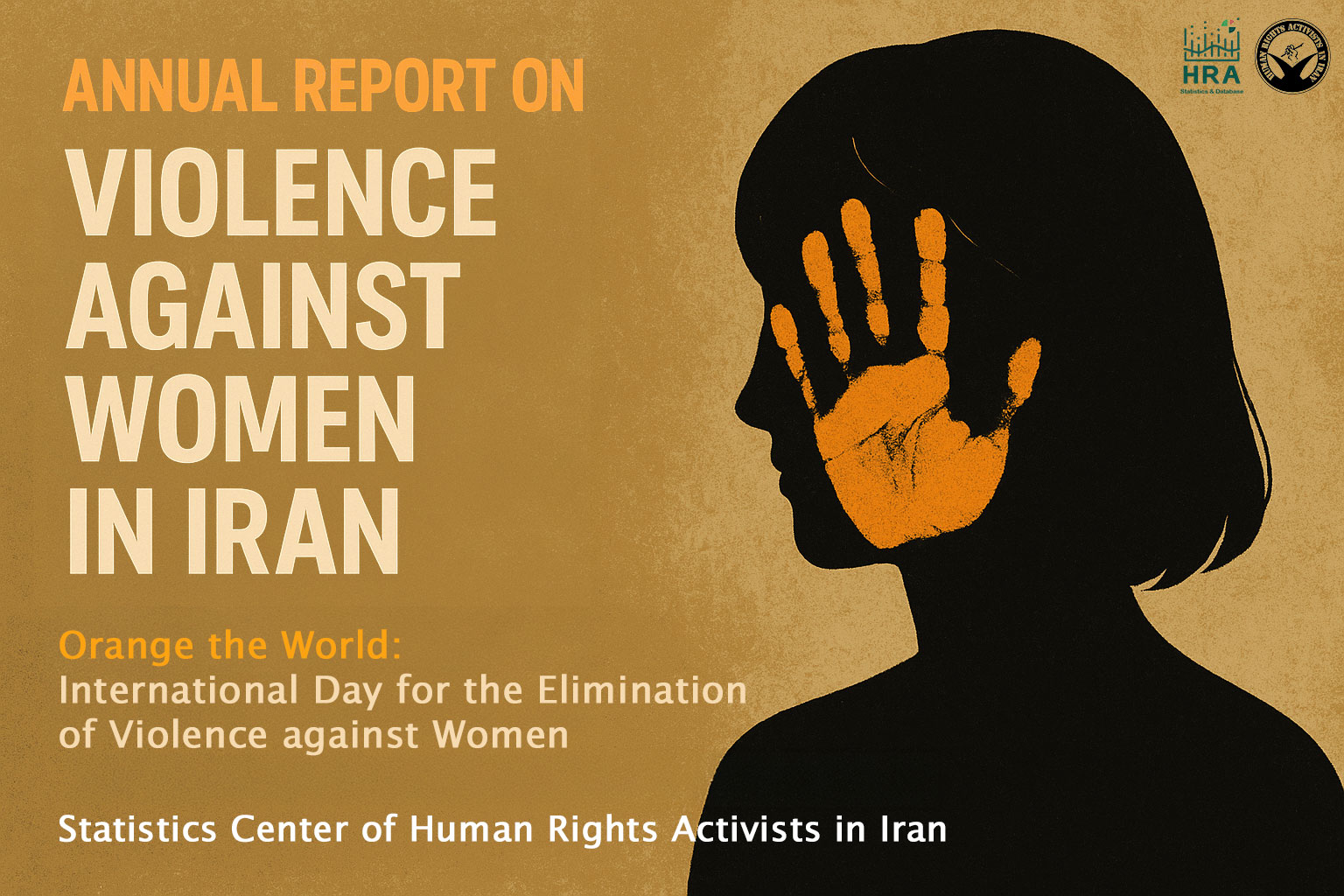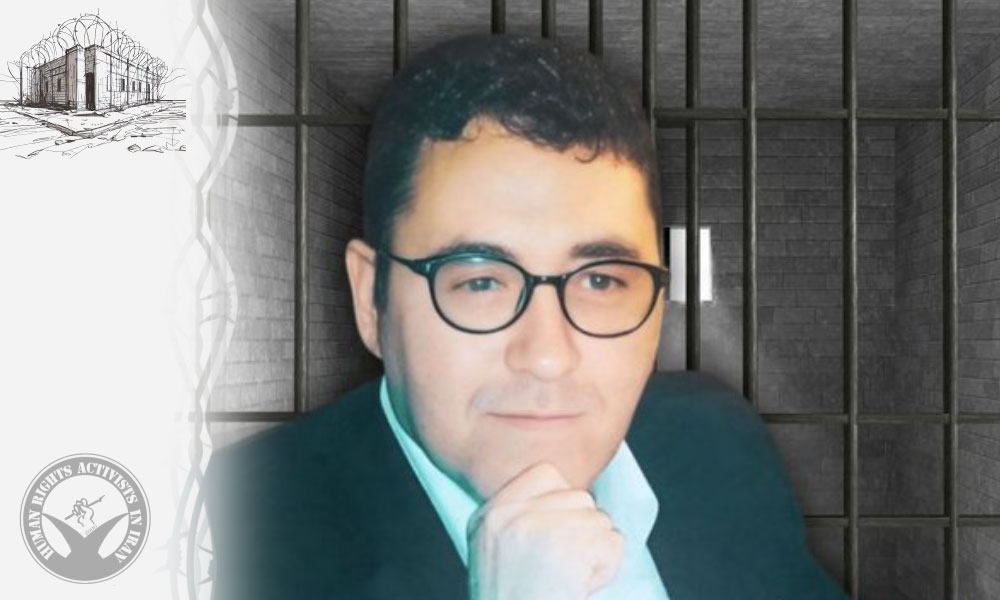Death sentences of four Sunni men from Iran’s Kurdish minority have been upheld by Iran’s Supreme Court. They are at imminent risk of execution. All men are believed to have been tortured or otherwise ill-treated while in detention. They did not have a lawyer.
On 14 November 2010, Jamshid Dehghani, his younger brother Jahangir Dehghani, Hamed Ahmadi and Kamal Molayee were sentenced to death by Branch 28 of the Revolutionary Court of Tehran and were denied the assistance of a lawyer during their trial. They had been convicted for vaguely-worded offences such as “enmity against God” (moharebeh) and “corruption on earth” (ifsad fil-arz). All four men were recently informed that their death sentences had been upheld by the Supreme Court and their case transferred to the Office for the Implementation of Sentences, the official body in charge of carrying out executions. They have been told informally by a prison official that their executions will be carried out in the coming days.
All four men were arrested in June and July 2009 by men in plain clothes believed to be from the Ministry of Intelligence and were taken to a detention centre run by the Ministry of Intelligence in Sanandaj, Kordestan. They were held in solitary confinement in Sanandaj and Hamedan in west Iran, until February 2011, when they were transferred to Raja’i Shahr Prison in Karaj near Tehran.
The men were accused, together with six others, of involvement in the assassination of a senior Sunni cleric close to the authorities on 17 September 2009. They have denied any involvement in the assassination, saying that their arrest and detention preceded the assassination by several months. Amnesty International understands that they were tortured or otherwise ill-treated while in pre-trial detention. They were threatened with the arrest of family members and were forced to sign papers without being allowed to read them.
Please write immediately in Persian, Arabic, English or your own language:
Urging the Iranian authorities not to execute the four men sentenced to death (please name them) and order a re-trial in proceedings which comply with fair trial standards without recourse to the death penalty, and to commute all death sentences in Iran;
Urging the authorities to effectively investigate the allegations that they were tortured and otherwise ill-treated and disregard as evidence in court any “confessions” that may have been obtained under torture;
Calling on the authorities to make sure the men are protected from torture and other ill-treatment; are granted all necessary medical treatment; and are allowed immediate and regular contact with their lawyers and families.
PLEASE SEND APPEALS BEFORE 31 OCTOBER 2013 TO:
�
Leader of the Islamic Republic
Ayatollah Sayed ‘Ali Khamenei�The Office of the Supreme Leader�Islamic Republic Street – End of Shahid�Keshvar Doust Street, �Tehran, Islamic Republic of Iran�Email: [email protected] �Twitter: @khamenei_ir
Salutation: Your Excellency
Head of the Judiciary
Ayatollah Sadegh Larijani
c/o Public Relations Office
Number 4, 2 Azizi Street intersection
Tehran, Islamic Republic of Iran
Email: [email protected] (Subject line: FAO Ayatollah Sadegh Larijani)
Salutation: Your Excellency
And copies to:
Secretary General High Council for Human Rights
Mohammed Javad Larijani�c/o Office of the Head of the Judiciary�Pasteur St, Vali Asr Ave
South of Serah-e Jomhouri�Tehran, Islamic Republic of Iran �Email: [email protected] (Subject line: FAO Mohammad Javad Larijani)�
Also send copies to diplomatic representatives accredited to your country. Please insert local diplomatic addresses below:
Name Address 1 Address 2 Address 3 Fax Fax number Email Email address Salutation Salutation
Please check with your section office if sending appeals after the above date.
�
URGENT ACTION
death sentences upheld, executions imminent
ADditional Information
Brothers Jamshid Dehghani and Jahangir Dehghani were arrested on 17 June 2009 when they were at work. Kamal Molayee and Hamed Ahmadi were arrested, respectively, on 15 July and 30 July 2009. They were not allowed to contact their families in order to inform them of their arrest and their families remained unaware of their whereabouts for months.
All four men state that they were arrested for their peaceful religious activities, including holding religious classes for children and discussions at their local mosque.
Another six men who appeared with them in the court hearing in November 2010, Bahram Ahmadi, Asghar Rahimi, Behnam Rahimi, Mohammad Zaher Bahmani, Keyvan Zand Karimi, and Hooshyar Mohammadi, were all executed on 27 December 2012.
Iran’s Kurdish minority lives mainly in the west and north-west of the country. They experience discrimination in the enjoyment of their religious, economic and cultural rights. Parents are banned from registering their babies with certain Kurdish names, and religious minorities that are mainly or partially Kurdish are targeted by measures designed to stigmatize and isolate them. Kurds are also discriminated against in their access to employment, adequate housing and political rights, and so suffer entrenched poverty, which has further marginalized them. Kurdish human rights defenders, community activists, and journalists often face arbitrary arrest and prosecution. Others – including some political activists – suffer torture, grossly unfair trials before Revolutionary Courts and, in some cases, the death penalty.
Iran is a state party to the International Covenant on Civil and Political Rights, Article 27 of which states: “In those States in which ethnic, religious or linguistic minorities exist, persons belonging to such minorities shall not be denied the right, in community with the other members of their group, to enjoy their own culture, to profess and practice their own religion, or to use their own language.” In September 2010, the UN Committee on the Elimination of Racial Discrimination (CERD), in its concluding observations on Iran’s 18th and 19th periodic reports, urged the Iranian authorities, among other things, to “take the necessary steps to achieve effective protection from discrimination against, inter alia, Arab, Azeri, Balochi and Kurdish communities and some communities of non–citizens… in various domains, in particular, employment, housing, health, education and freedom of expression and religion”.
The death penalty is used extensively in Iran. Officially, so far 236 executions have been acknowledged by Iranian authorities for 2013 – 23 in September alone – but reliable sources have reported at least 160 additional executions during the year. Amnesty International is opposed to the death penalty in all circumstances without exception. It is a violation of the right to life as enshrined in the Universal Declaration of Human Rights and international human rights treaties to which Iran is a state party and is the ultimate cruel, inhuman and degrading punishment.
For more information on human rights violations against the Kurdish minority in Iran, see: Iran: Human rights abuses against the Kurdish minority, (Index MDE 13/088/2008) 30 July 2008, available at: http://www.amnesty.org/en/library/asset/MDE13/088/2008/en/d140767b-5e45-11dd-a592-c739f9b70de8/mde130882008eng.pdf
Name: Jahangir Dehghani, Jamshid Dehghani, Kamal Molayee, Hamed Ahmadi
Gender m/f: all m
�
UA: 258/13 Index: MDE 13/037/2013 Issue Date: 19 September 2013



